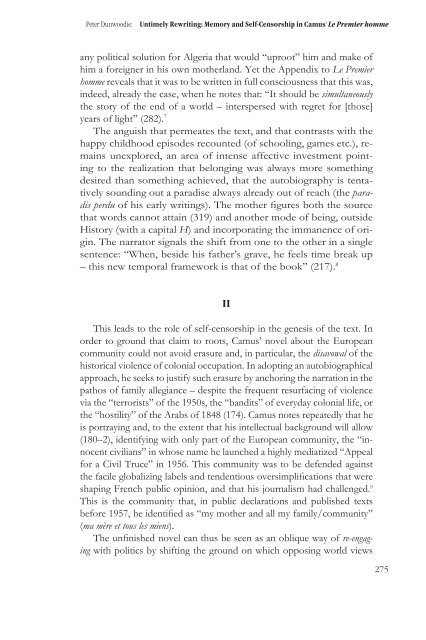Literatura in cenzura - Društvo za primerjalno književnost - ZRC SAZU
Literatura in cenzura - Društvo za primerjalno književnost - ZRC SAZU
Literatura in cenzura - Društvo za primerjalno književnost - ZRC SAZU
- No tags were found...
Create successful ePaper yourself
Turn your PDF publications into a flip-book with our unique Google optimized e-Paper software.
Peter Dunwoodie:Untimely Rewrit<strong>in</strong>g: Memory and Self-Censorship <strong>in</strong> Camus' Le Premier hommeany political solution for Algeria that would “uproot” him and make ofhim a foreigner <strong>in</strong> his own motherland. Yet the Appendix to Le Premierhomme reveals that it was to be written <strong>in</strong> full consciousness that this was,<strong>in</strong>deed, already the case, when he notes that: “It should be simultaneouslythe story of the end of a world – <strong>in</strong>terspersed with regret for [those]years of light” (282). 7The anguish that permeates the text, and that contrasts with thehappy childhood episodes recounted (of school<strong>in</strong>g, games etc.), rema<strong>in</strong>sunexplored, an area of <strong>in</strong>tense affective <strong>in</strong>vestment po<strong>in</strong>t<strong>in</strong>gto the reali<strong>za</strong>tion that belong<strong>in</strong>g was always more someth<strong>in</strong>gdesired than someth<strong>in</strong>g achieved, that the autobiography is tentativelysound<strong>in</strong>g out a paradise always already out of reach (the paradisperdu of his early writ<strong>in</strong>gs). The mother figures both the sourcethat words cannot atta<strong>in</strong> (319) and another mode of be<strong>in</strong>g, outsideHistory (with a capital H) and <strong>in</strong>corporat<strong>in</strong>g the immanence of orig<strong>in</strong>.The narrator signals the shift from one to the other <strong>in</strong> a s<strong>in</strong>glesentence: “When, beside his father’s grave, he feels time break up– this new temporal framework is that of the book” (217). 8IIThis leads to the role of self-censorship <strong>in</strong> the genesis of the text. Inorder to ground that claim to roots, Camus’ novel about the Europeancommunity could not avoid erasure and, <strong>in</strong> particular, the disavowal of thehistorical violence of colonial occupation. In adopt<strong>in</strong>g an autobiographicalapproach, he seeks to justify such erasure by anchor<strong>in</strong>g the narration <strong>in</strong> thepathos of family allegiance – despite the frequent resurfac<strong>in</strong>g of violencevia the “terrorists” of the 1950s, the “bandits” of everyday colonial life, orthe “hostility” of the Arabs of 1848 (174). Camus notes repeatedly that heis portray<strong>in</strong>g and, to the extent that his <strong>in</strong>tellectual background will allow(180–2), identify<strong>in</strong>g with only part of the European community, the “<strong>in</strong>nocentcivilians” <strong>in</strong> whose name he launched a highly mediatized “Appealfor a Civil Truce” <strong>in</strong> 1956. This community was to be defended aga<strong>in</strong>stthe facile globaliz<strong>in</strong>g labels and tendentious oversimplifications that wereshap<strong>in</strong>g French public op<strong>in</strong>ion, and that his journalism had challenged. 9This is the community that, <strong>in</strong> public declarations and published textsbefore 1957, he identified as “my mother and all my family/community”(ma mère et tous les miens).The unf<strong>in</strong>ished novel can thus be seen as an oblique way of re-engag<strong>in</strong>gwith politics by shift<strong>in</strong>g the ground on which oppos<strong>in</strong>g world views275
















